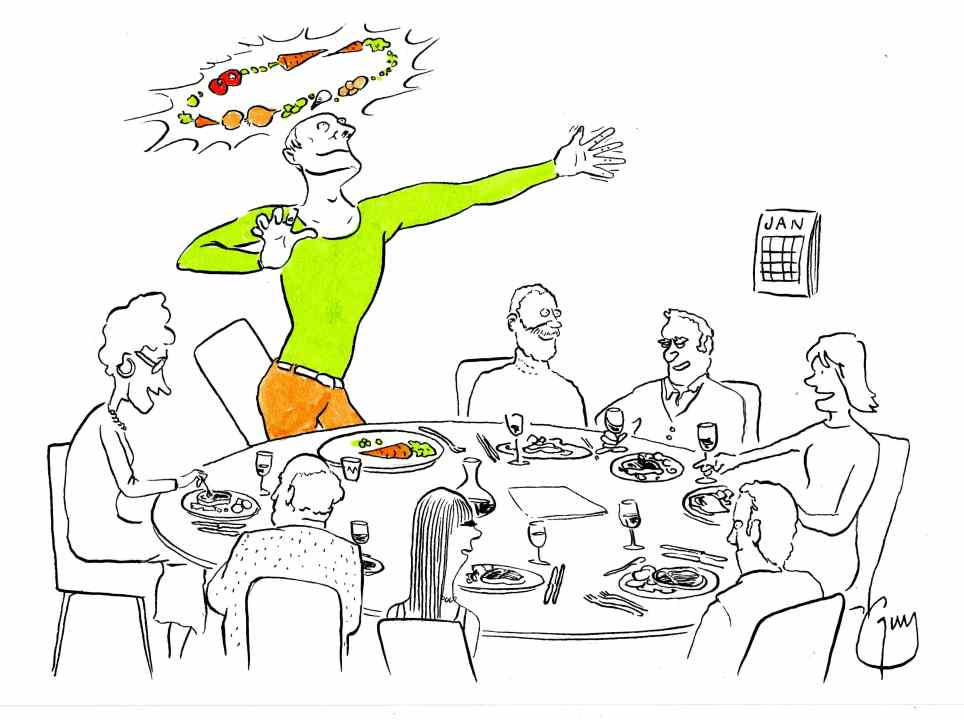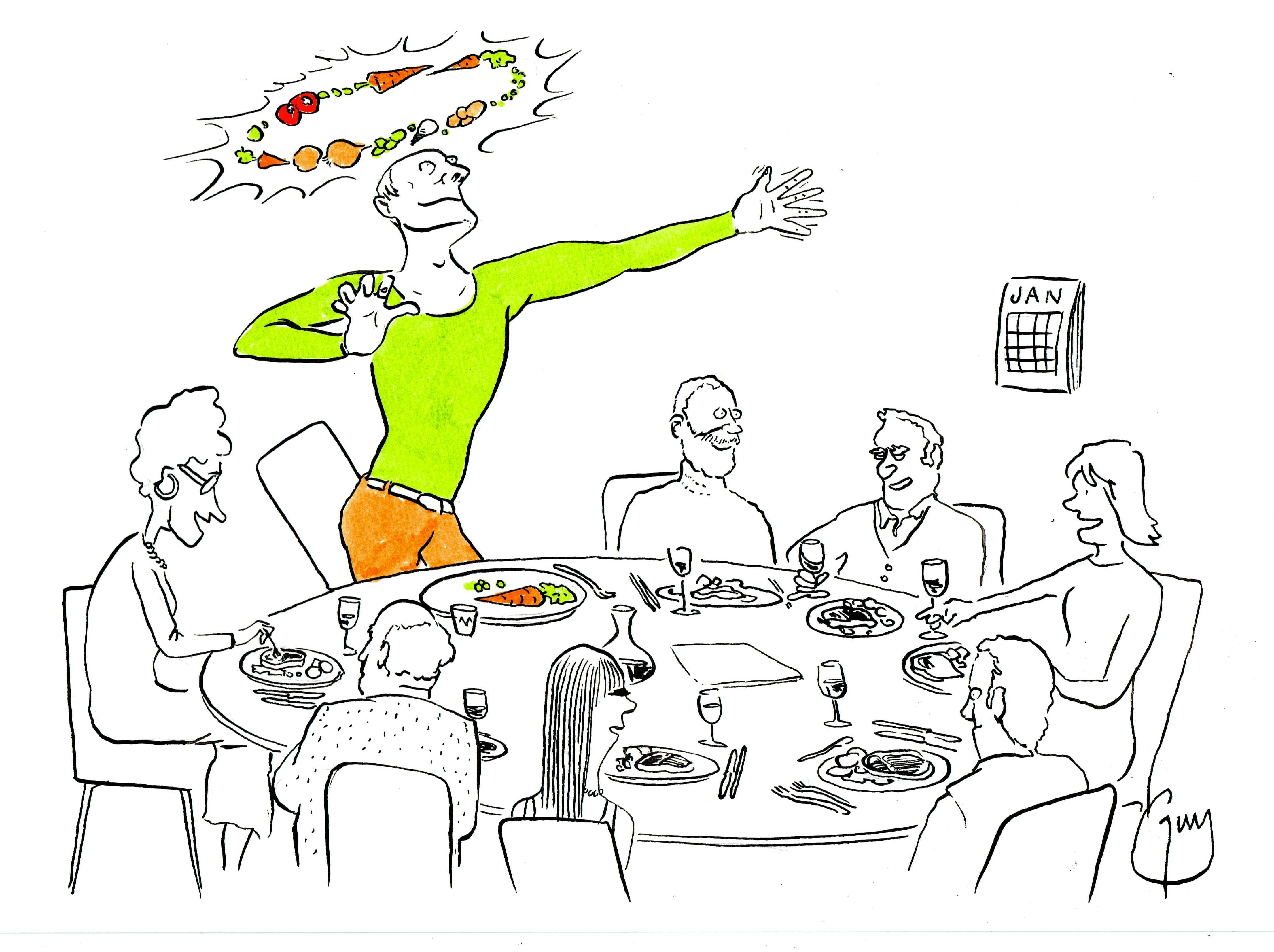Despite appearances, the word ‘Veganuary’ is not a part of the female anatomy – nor is it a venereal disease. It’s probably as irritating as the latter, however, and I dare say just as resistant to even the most powerful antibiotics.
In case you are unfamiliar with this unsavoury neologism, its refers to an annual initiative, first launched in 2014, to get people to forgo meat, poultry, fish and dairy products for the first 31 days of the year.
That’s right, it’s like an especially joyless form Dry January dreamt up for masochists – those seeking the black-belt in self-denial, and a sure-fire way to usher in the January blues.
Despite this, it’s been more successful than you’d suppose. So far Veganuary’s organisers claim millions of people have given it a go over the years, with some 500,000 alone signing up for the 2021 ‘one month vegan pledge’. Veganuary, also the name of the organisation behind the drive, explicitly calls it a campaign because that’s what it is – this advocacy group wants nothing less than ‘a fully vegan world’, not just in January but also ‘beyond’. In other words, all the time.
So while it has a mildly irksome name, the underlying ambition of Veganuary is far more insidious: these people want the rest of us to stop eating meat, poultry, fish and dairy altogether. Forever.
Now, I dare say, like you I’m very happy for others to be vegans if they want to. Go for it. I think there’s a lot to be said for it. And, frankly, who doesn’t like the occasional vegan sausage? As an empirical exercise in gastronomic ingenuity it has no peer – that you can replace the flawless simplicity of a pork sausage with a compacted concoction of white beans, nuts, oats and God knows what else, that ends up looking almost the same and is still edible, is a modern technological miracle.
But Veganuary isn’t about having a few meat-free days each week or now and then – even the Prince of Wales is an advocate of this quite sensible way of eating. Rather, Veganuary is a campaign explicitly setting out to change the way we have lived and eaten since homo sapiens first climbed down from the trees and learned to walk on two feet. And that’s my beef with it.
Most of us are already aware that our diets are going to have to change over the next 20 years, without the need to fast-track the process. To feed the estimated 10 or 11 billion people on the planet in 2050 with a Western diet as we have it now, you would need an additional landmass five times the size of India. Even if Elon Musk’s wildest dreams of interplanetary living come about, complete with Ocado delivery slots, we won’t meet the demand.
So we will need to eat less beef, as well as other farmed animals. And this is whether we like it or not: as millions more middle class consumers enter the world economy in the years ahead, the price of meat will go up – with pressure exacerbated by greater competition for land and the impact of climate change potentially reducing agricultural yields on what’s left. As a result many of us will be forced to choose plant-based alternatives because they’ll be cheaper. Consultant AT Kearney has predicted that come 2040, the majority of meat we eat (60 per cent) would not be the slaughtered or the dead variety – rather it would be ‘cultured’ meat grown in labs or clever meat substitutes, like some of those deceptively good-looking vegan sausages. Now, is that a reason to give up meat immediately? Or grounds for savouring the good stuff while it’s still affordable? I’d wager we’d be better off opting for the latter.
But my major objection to Veganuary is the timing. Veganuary claims being vegan helps save tonnes of carbon emissions. But if half a million people are going vegan in January, you can predict the sales of avocados, blueberries, strawberries and just about any tasty-looking out-of-season fruit or vegetable you can think of will go through the roof.
Instead of reducing the carbon intensity of food, this kind of stunt will have heavily laden Airbuses and Boeing taxi-ing down the runways from Nairobi to Sao Paolo, Cape Town and all points in between, like never before – each loaded to the gunwales with asparagus, green beans and goodness knows what else. They’re all destined for a Waitrose or Sainsbury’s near you. One study by a University of Manchester academic argues that asparagus has the highest carbon footprint of any vegetable eaten in Britain with 5.3 kilos of greenhouse gasses emitted for every kilo. And that’s before you start on blueberries or avocados, which require gazillions of litres of water to grow, yet are often cultivated in places where water scarcity is a major problem. Just imagine the harm if, say, five million of us adopt this eating regime in January.
So if you want to try out veganism, go for it, but don’t do it in January: do it in October instead with harvest festivals celebrating the bounty of nature across Britain. It’s a pity Veganuary didn’t call itself ‘Plantober’ instead.
January is time to be feasting on our wonderful root vegetables, taking the peerless parsnip to new culinary realms; making the most of Brussels sprouts. And it’s time to get in the protein, the old-fashioned, time-honoured way by taking advantage of that original walking protein store – livestock. It’s been fattened up over the warmer months, and it’s just waiting to sustain us through the dark winter.
Should we eat less meat for our health and for the planet? Absolutely. Should we follow Prince Charles and opt for meat-free days? Bang on. But whatever you do, rule out Veganuary and visit your butcher instead.







Comments